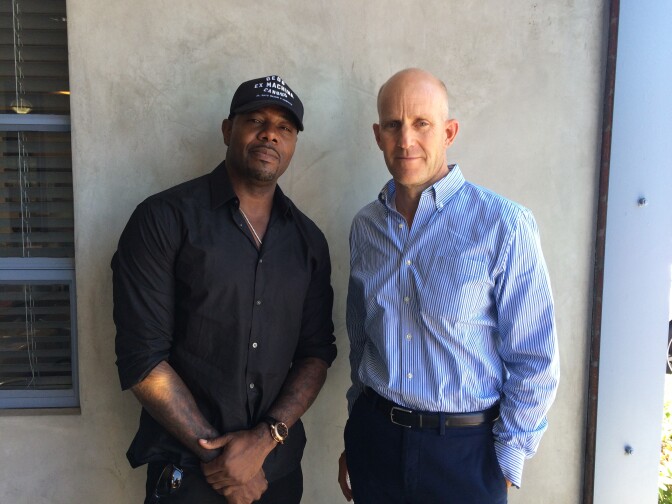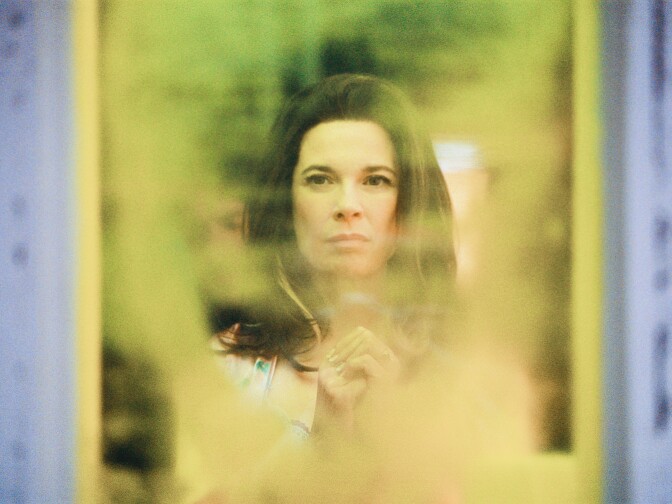Today on The Frame, we hear from 'Training Day' director Antoine Fuqua about his unfinished Showtime documentary on Suge Knight and how he got the news the rap mogul had recently been shot six times. Then, we talk to director Xavier Dolan at the Telluride Film Festival where his feature, "Mommy," is screening after winning the Jury Prize at Cannes. We also hear from 27-year-old Brad Colburn on how he amassed a following of people who watch him play video games online, (Yes, that's a thing.) Plus, why the Converse shoe brand is paying for up-and-coming musicians' studio time.
Antoine Fuqua adds new chapter to Suge Knight doc after rap mogul's shooting
Director Antoine Fuqua — who is making a documentary for Showtime on rap mogul Suge Knight — at first thought Knight had been killed when he first got word of Knight's shooting on Aug. 24.
Speaking to KPCC's The Frame, Fuqua said, "I was in New York. I just finished 'Southpaw,' and I had just spoken to Suge that morning about grabbing dinner when I got back to finish talking about the doc and catch up on things. By the time I landed, I got a ton of calls that said he was shot. The first call I got said he was dead, because he was shot six times. That's what I was told. I spoke to a few of his close people, and they said that he'll survive it and that he's OK. I didn't want to know much more than that, really; I just wanted to make sure the guy was OK. I wouldn't wish that on anybody."
Fuqua is best known for directing high-octane action films such as “Training Day,” "Shooter" and "Olympus Has Fallen."
He recently re-teamed with Denzel Washington for “The Equalizer,” which opens in late September. He also just wrapped the boxing drama “Southpaw” with Jake Gyllenhaal, which will be out next year.
While working on those feature films, he’s been making his documentary about Knight. Knight, the controversial co-founder of Death Row Records, was in the news after he was shot multiple times at a West Hollywood club.
Knight is recovering from surgery and is expected to survive.
We asked Fuqua about how he heard about the shooting, and he explains the intended message of his Suge Knight documentary:
On why he wanted to do a documentary about Knight:
"It's been two or three years that I've been working on this documentary with Suge. When I got involved with the Tupac Shakur movie at that time, ... what I found interesting was that these young guys — Dr. Dre, Snoop, Suge, all of them — they achieved quite a bit. Everything you hear has been negative, even up to now on Suge's part. When I first met Suge, one of the conversations I had with Suge was, it'll be good to just tell your own story. Not to bash anybody else, not to say anything negative about it, just tell your story about how you achieved that and how you lost a lot."
On the difficult message of his unfinished doc:
"Young kids today who want to be music producers and moguls, they only see the flash, and they're forgetting about the downfall. I thought there's an obligation for [Knight] to explain how he did it, so they can understand how they can achieve it as well, and how he lost it, so they can understand what not to do. It's just that it's a difficult thing to do; there's a lot of layers and a lot of people who just want it to go away. They want the past to go away. But I do still feel like there's an obligation to a lot of young people, a generation, to just understand what really happened. What happened to Tupac? How did they lose that? They built a company that I think was worth $800 million, Death Row Records, they did it. All of them.
On Knight reaching, then losing hold of the American Dream:
"No matter whether they all get along now or not doesn't matter, because they did a great thing as far as the American Dream. They achieved it. Some of them continued on, like Dre's doing fantastic, and he should — he's a talented guy. Snoop is doing well. Suge seems to be the only one who's still going through more drama constantly.
"I was so just curious of why, and I wanted to find out, how do you stop that? How do you stop it? Because that's all we see. The more that happens, the more these young people like Michael Brown, the young kid that was just murdered — somehow for me it all bleeds into the music and the world and the image that we project. And maybe if we can explain some of it, maybe some young kids will understand. Maybe some cops will understand it.
"It was a moment in time where these young rappers, these young moguls, including Jay-Z's company, him and Damon Dash. They did some fantastic things. There was Murder, Inc. They built these companies, and they were worth hundreds of millions of dollars. And where are they now? Besides Jay-Z. ...What happened to Murder, Inc? What happened to Damon Dash? We know what's going on with Suge because he's always in the press. Showtime, they've been really patient, man. I have to get this to them, and I was to get it done and get it out there, too. I think it's important."
Telluride Film Fest: 25-year-old filmmaker Xavier Dolan on 'Mommy,' the festival circuit
It takes almost a day to get here, you don’t know what movies you’ll see until you arrive, and almost everybody, no matter how famous, has to wait in lines — long lines.
But those idiosyncrasies are part of what makes the Telluride Film Festival so distinct and so original.
Running over Labor Day weekend, the festival has premiered several recent best picture winners, including “Argo,” “The King’s Speech,” “Slumdog Millionaire” and last year’s “12 Years a Slave.”
This year, the festival is set to premiere "Daily Show" host Jon Stewart’s directorial debut, the set-in-Iran drama “Rosewater.” Also screening is “Wild," an adaptation of the bestselling book starring Reese Witherspoon as a hiker searching for meaning and comfortable boots on the Pacific Crest Trail.
As the festival kicked off in the Colorado resort town, we caught up with Xavier Dolan, the 25-year-old writer and director of “Mommy," a French-Canadian drama about a single mother raising a son who is struggling with bipolar disorder, and likely to be a contender for the foreign language Oscar.
Converse hosts a free pop-up studio for up-and-coming LA bands
Being in a band is no cheap endeavor. You have to buy and maintain your instruments, there are touring costs and, of course, the sometimes prohibitive cost of booking a recording studio. The sneaker company Converse is trying to help solve the latter challenge for up-and-coming bands by letting them use a professional studio for a day — at no cost.
Converse Rubber Tracks started in Brooklyn three years ago and has expanded globally — from Toronto to Johannesburg and now Los Angeles. Jed Lewis, Music Marketing Director for Converse, said he loves what this program does for young bands since he used to be a struggling musician himself and knows how much renting a recording studio can cost.
Mirror Talk was one of the bands selected for the pop-up studio in Los Angeles. They're a new wave-R&B band that formed two years ago, but the members have been playing music together for more than seven years. Guitarist Steven Lopez says the band wants to emulate the sound quality from records they’re inspired by – artists such as Prince and New Order.
The band plans on using the tracks they record at the pop-up studio for their upcoming EP titled “1997.” As for Converse Rubber Tracks, there’s another session planned for L.A. in late September.
How gamer 'The Rad Brad' makes a living playing video games
Did you know that people really like watching people play video games online?
This week, Amazon bought the video game streaming service, Twitch, for $970 million. The site allows users to watch and interact with people playing video games in real time.
This phenomenon of watching gamers online has been rising in popularity in recent years, on Twitch, but especially on YouTube.
27-year-old Brad Colburn has made it his career. Known as “The Rad Brad” on YouTube, he’s been making a living since 2012 by posting videos of himself wielding his controller. Today he has more than 3.2 million subscribers and his videos regularly rake in hundreds of thousands of views — and the advertising that goes with that.
The Frame producer Michelle Lanz got Brad on the line from Atlanta to talk about the big business of gameplay webcasting.






